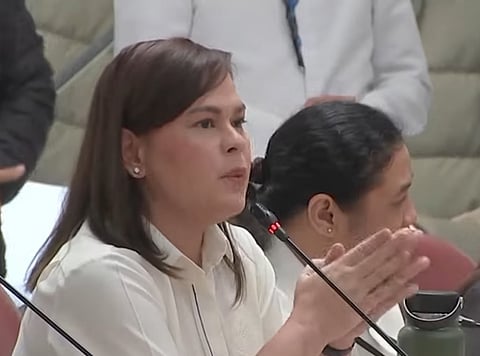Philippines: 7 articles of impeachment against Vice President Sara Duterte
As mid-term elections loom, the Vice President's impeachment trial will have to wait

Manila: Philippine Vice President Sara Duterte is set to face impeachment proceedings in the Senate, after the House of Representatives voted to impeach her based on seven charges (below).
It was the fourth impeachment complaint against the feisty vice president – three other complaints earlier filed against her, centred around her alleged misuse of public funds – were canned.
On Wednesday, with 215 votes, the 307-member House of Representatives voted to impeach Duterte.
Her brother, Paolo Duterte, Representative of Davao City's First District, did not sign it, and dismissed the move as baseless: "The sinister maneuvering of certain lawmakers, led by Rep. Garin, to hastily collect signatures and push for the immediate approval and transmittal of this baseless impeachment case is a clear act of politicial persecution."
The sinister maneuvering of certain lawmakers, led by Rep. Garin, to hastily collect signatures and push for the immediate approval and transmittal of this baseless impeachment case is a clear act of politicial persecutionPaolo Duterte, Representative of Davao City's First District (brother of Vice President Sara Duterte)
Rep. Joel Chua, member of the House of Representatives prosecution team, countered: "First, she threatened the President, the First Lady, and the Speaker, claiming she hired an assassin to kill them. Next is the misuse of confidential funds. Then there's the bribery issue, arising from the testimony of Usec. Mercado."
Chua, in an interview with local media, was referring to Gloria Mercado, ex-undersecretary of Education and Head of Procuring Entity (HoPE), who admitted to a House panel that from February to September 2023, she “received a total of nine envelopes labeled ‘HoPE'. And “50K” (pesos).
Mercado claimed she was given the Php50,000 monthly from Duterte supposedly “to influence” her decisions on the agency’s biddings.
First, she threatened the President, the First Lady, and the Speaker, claiming she hired an assassin to kill them. Next is the misuse of confidential funds. Then there's the bribery issue, arising from the testimony of Usec. MercadoRep. Joel Chua, member of the House of Representatives prosecution team
7 articles of impeachment
The complaint against Duterte includes several serious allegations:
#1. Culpable violation of the Constitution: Duterte is accused of committing high crimes and breach of constitutional provisions for contracting an assassin and plotting to murder or assassinate the incumbent President, First Lady and Speaker of the House, which she publicly admitted in a live broadcast.
#2. Graft and corruption: Allegations have been made regarding the misuse and malversation of public funds of the Office of the Vice President, and alleged misappropriation of 612.5 million pesos ($10.55 million) in “confidential funds” during her tenure as Secretary of Education.
#3. Bribery: Duterte faces accusations of engaging in bribery and financial manipulation within the education ministry.
#4. Unexplained wealth: She has been accused of possessing unexplained wealth and failing to declare all her assets (statement of assets, liabilities and net worth) as mandated by the Constitution.
#5. Conspiracy to commit high crimes: Duterte is accused of threatening to hire an assassin to kill President Ferdinand Marcos Jr., the First Lady, and the president’s cousin, Martin Romualdez, the Speaker House of Representatives. This has been a focal point of the impeachment proceedings. This includes extra-judicial killings in Davao City during her tenure as City Mayor.
#6. Political destabilisation: She is accused of organisation a political destabilisation plot against Marcos Jr, including the high crimes of sedition and insurrection. She has publicly stated Marcos Jr does not know how to lead. She has also publicly stated: “I imagines myself cutting his (Marcos Jr.’s) head.”
#7. Betrayal of public trust: This article is based on “the totality of the respondent’s (Duterte) conducte as vice president,” which the charge sheet cites as acts constituting a “betrayal of public trust.”
What happens next
The Southeast Asian nation has a history of impeaching government officials, most notably former President Joseph Estrada and Chief Justice Renato Corona.
An impeachment trial could result in removal and disqualification from holding office, as per the 1987 Constitution.
Following her impeachment by the lower House, Duterte now faces trial in the Senate, which must convene an impeachment tribunal to determine her political fate.
However, with Congressional recess looming for the May 12, 2025 mid-term elections, the Senate trial may take place only in June at the earliest, with a new set of Senators and members of the House of Representatives.
An impeachment trial could result in a significant political confrontation: with 24 senators set to deliberate, at least 16 votes are required to convict her on any of the charges — each of which carries the penalty of removal from office and a lifetime ban from holding public posts.
A conviction would not necessarily lead to her arrest.
However, Duterte remains vulnerable to prosecution in other legal venues. A conviction will keep the door open for legal battles ahead.
It could also fuel uncertainty as the Asian country battles with neighbours to bring in fresh investments, create more jobs, secure its energy supplies and build badly-needed infrastructure.



